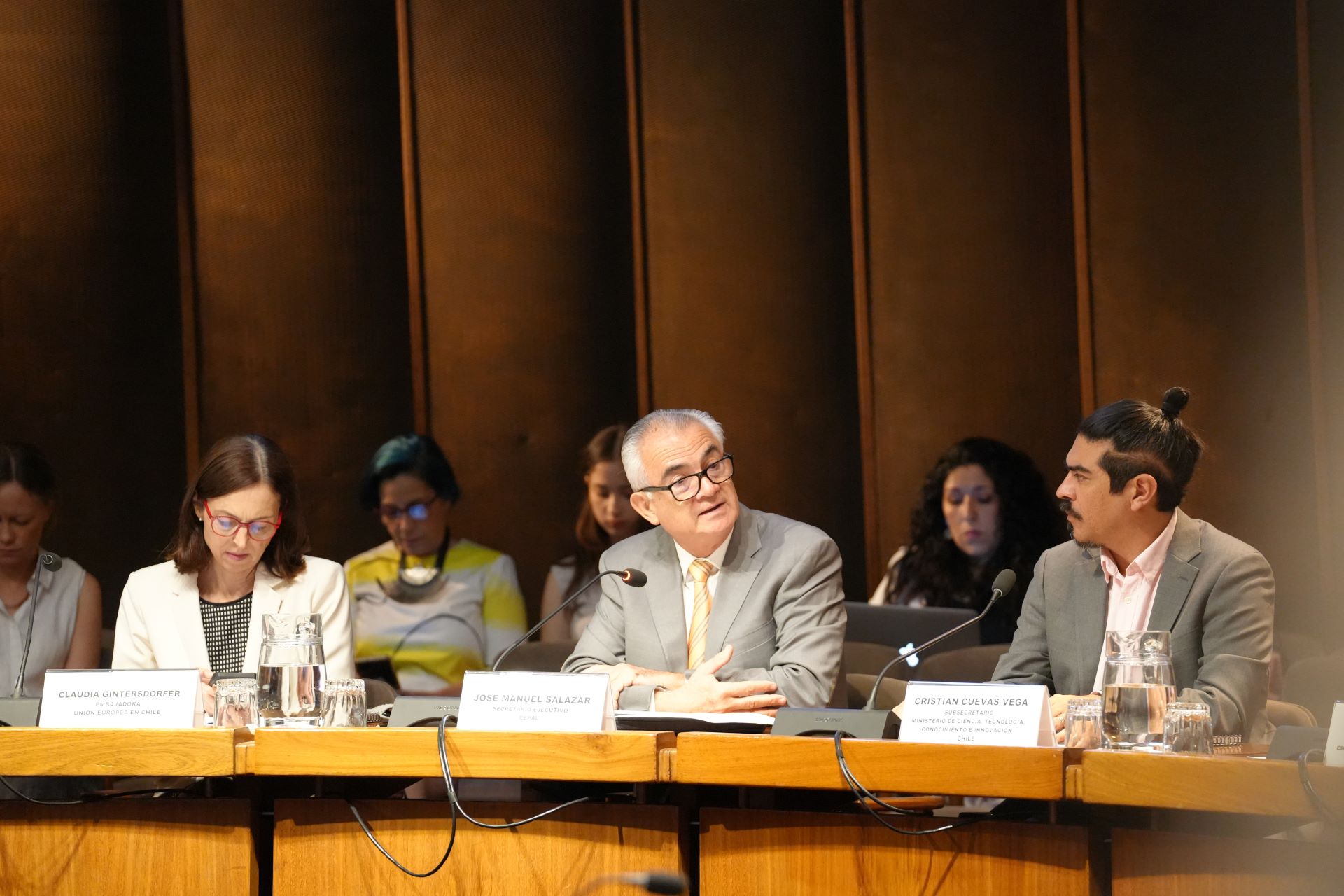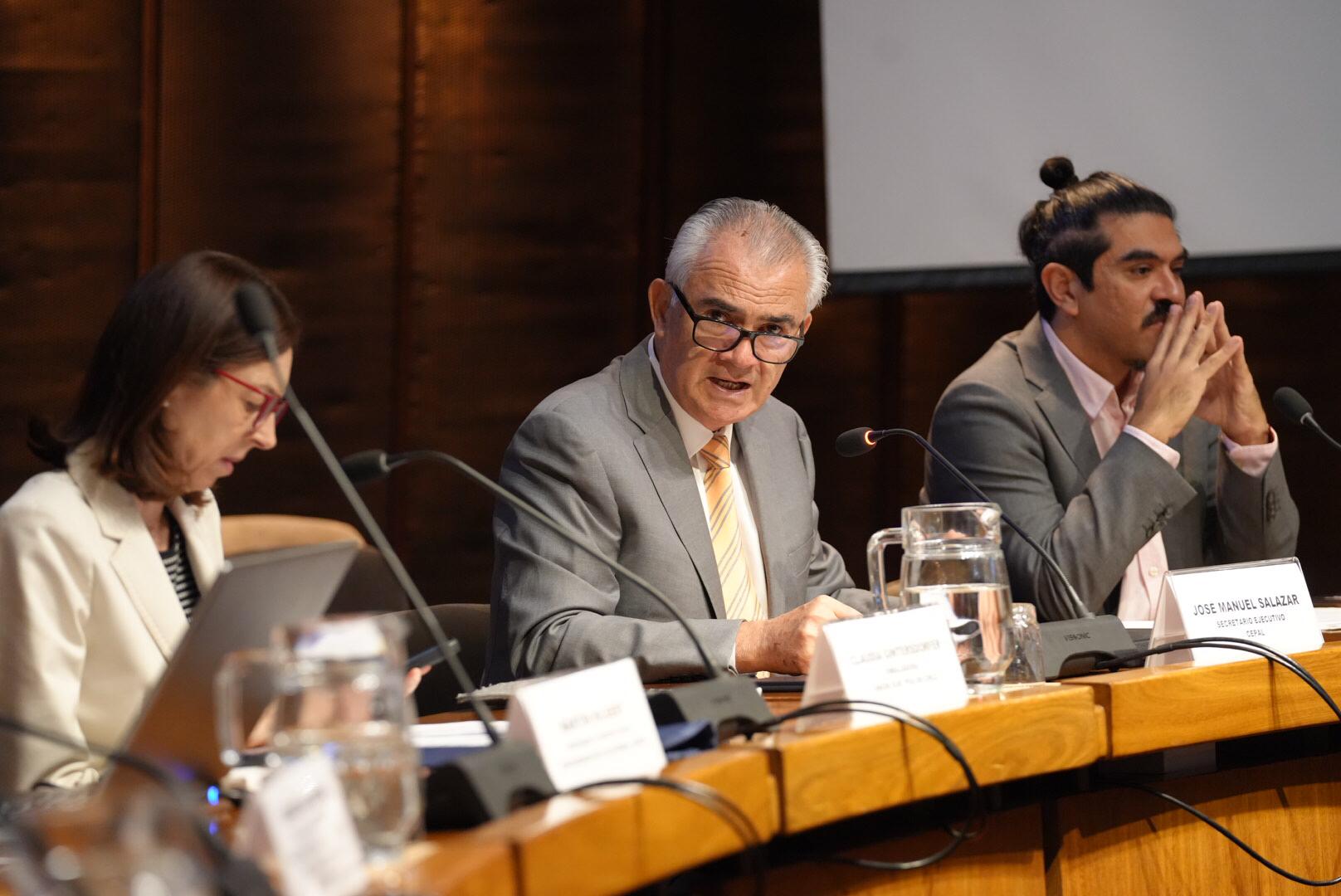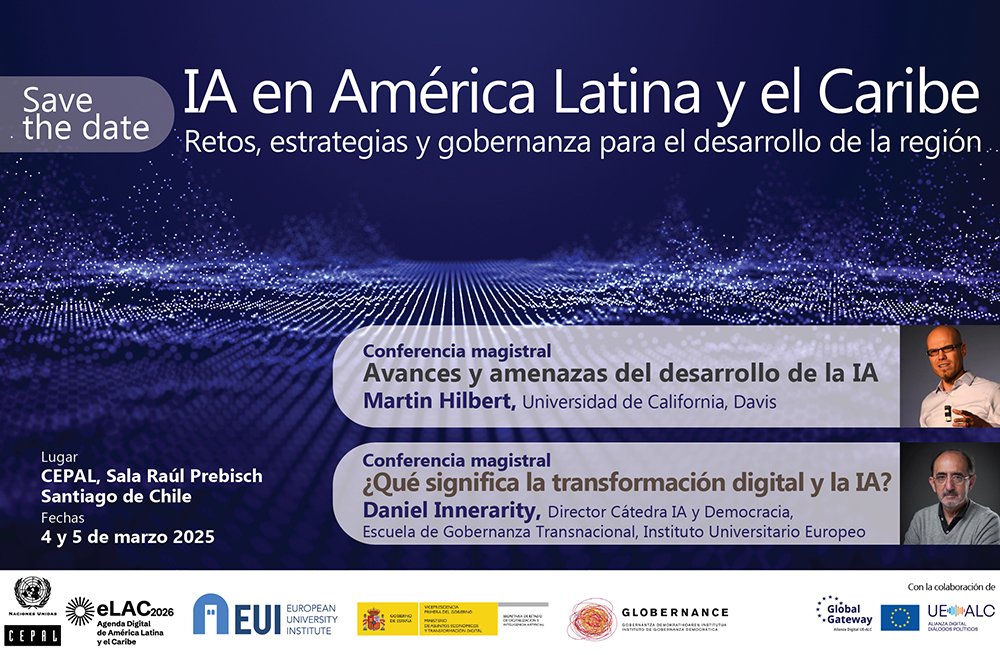Artificial Intelligence Is Changing the World, and Latin America and the Caribbean Cannot Fall Behind
Work area(s)
At ECLAC, authorities and experts analyze AI’s potential for overcoming the development traps in which the region is mired and driving essential transformations to achieve more productive, inclusive and sustainable development.

Artificial intelligence (AI) is transforming the world, and countries in Latin America and the Caribbean cannot be mere spectators. It is important to create a regional agenda regarding AI, authorities and experts agreed today at ECLAC’s headquarters during the first day of the conference titled “AI in Latin America and the Caribbean: challenges, strategies and governance for development in the region”.
The event, which will continue through Wednesday, March 5, is organized by the United Nations Economic Commission for Latin America and the Caribbean (ECLAC) and the AI and Democracy Chair at the Florence School of Transnational Governance of the European University Institute (EUI). The meeting’s goal is to explore AI’s potential for avoiding three significant traps that limit development in the region—low capacity for growth and productive development; high inequality, low social mobility and weak social cohesion; and weak institutionality and ineffective governance—and driving the eleven essential transformations ECLAC has promoted in order to achieve more productive, inclusive and sustainable development.
The conference was opened by José Manuel Salazar-Xirinachs, ECLAC’s Executive Secretary; Claudia Gintersdorfer, Ambassador of the European Union in Chile; Cristian Cuevas Vega, Subsecretary of Science, Technology, Knowledge and Innovation in Chile; and Amandeep Singh Gill, United Nations Secretary-General’s Envoy on Digital and Emerging Technologies, Office of Digital and Emerging Technologies (recorded message).
In his welcome speech, ECLEC’s Executive Secretary remarked that the organization will mainly concentrate on leveraging opportunities presented by AI for development in the region and avoiding the three traps of development. “Without a doubt, digital technologies are part of the solution to overcoming the development traps in which the region is mired. In economic terms, they can be significant drivers for dynamizing growth in productivity. In social terms, they can help reduce inequality and increase upward social mobility. And in institutional terms and governance, they can help build transparency, reduce corruption and the waste of resources and increase state efficiency and civic participation,” he stated.
But to move in these directions, Salazar-Xirinachs insisted on the necessity of using a real, effective, broad base of these technologies given that, if their adoption is limited to small sectors of society, companies and people, this new technological revolution would worsen inequality and exclusion, rather than generating greater equality and inclusion. “We must guarantee that AI does not deepen existing inequalities or become an additional factor of exclusion,” he affirmed.
The Ambassador of the European Union in Chile, Claudia Gintersdorfer, stated that artificial intelligence solutions offer great opportunities to governments, companies and citizens, but they can also pose risks. “In the European Union, we believe we need a regulatory framework that guarantees trustworthy AI based, among other things, on reliable and high-quality data,” she said.
For his part, the Subsecretary of Science, Technology, Knowledge and Innovation in Chile Cristian Cuevas Vega pointed out that AI is a historic opportunity for Latin America and the Caribbean, but it must be aligned with improving social conditions and reducing inequality. “We need our own AI governance model for Latin America and the Caribbean. More coordination between countries is urgently necessary. Many countries do not have updated national strategies in this area, and where there is some kind of regulation, it varies from country to country,” he explained.
In his recorded message, United Nations Secretary-General’s Envoy on Digital and Emerging Technologies Amandeep Singh Gill stated that the United Nations’ mission is clear: technology must serve humanity, not the other way around. “The UN offers an inclusive, transparent and equal space for digital cooperation. The Global Digital Compact, adopted at the Summit of the Future last September, is a comprehensive framework for managing digital technology and AI, based on progress made at the World Summit on the Information Society, the twentieth anniversary of which will be celebrated this year. The Compact is the first worldwide agreement that includes calls to action for promoting an inclusive digital economy, addressing online harm, promoting responsible management of information and managing AI for humanity,” he explained.
The first day of the conference on AI in Latin America and Chile also included a keynote speech titled “Artificial intelligence: the road so far and the course in play,” delivered by Martin Hilbert, Professor and expert in AI at the University of California, Davis (United States), as well as three panels on multilevel management of AI, enabling factors and development of regional capacities, and AI in the service of productive development: experiences and case studies.
The event’s second day (Wednesday, March 5) will include a keynote speech by Daniel Innerarity, Director of the AI and Democracy Chair, School of Transnational Governance of the European University Institute, titled “What does digital transformation and AI mean?” This will be followed by the presentation of a manual of good practices by the Ibero-American Network for Democracy and AI (REDemocracIA) and a fourth discussion panel on AI in the service of more inclusive development: experiences and case studies.
The complete conference programme (in Spanish) is available at this link.
Related content

Conferencia: “IA en América Latina y el Caribe: Retos, Estrategias y Gobernanza para el Desarrollo de la Región”
Palabras de bienvenida de José Manuel Salazar-Xirinachs, Secretario Ejecutivo de la CEPAL.
Related link(s)
Country(ies)
- Latin America and the Caribbean
Contact
Public Information Unit
- prensa@cepal.org
- (56 2) 2210 2040
